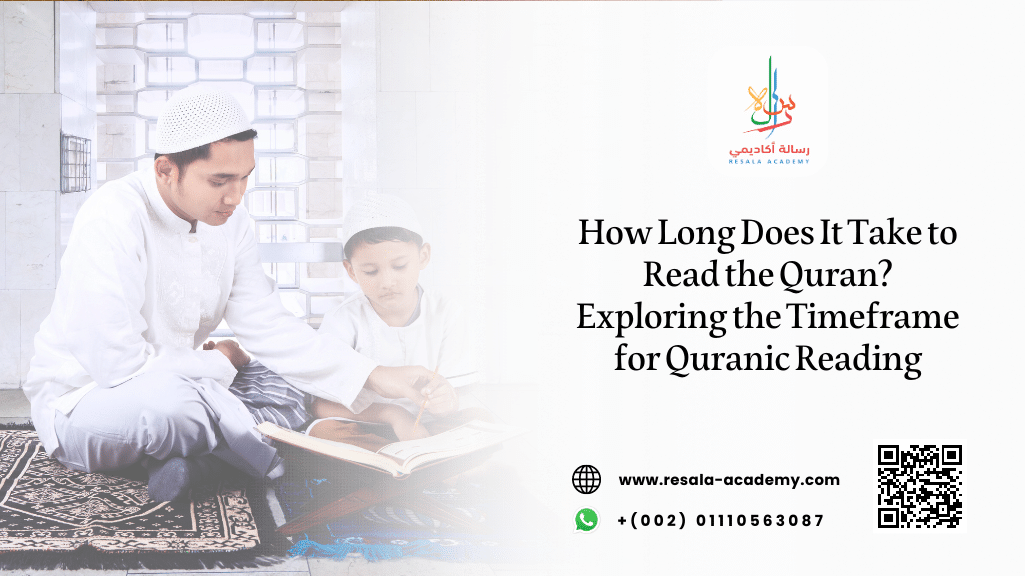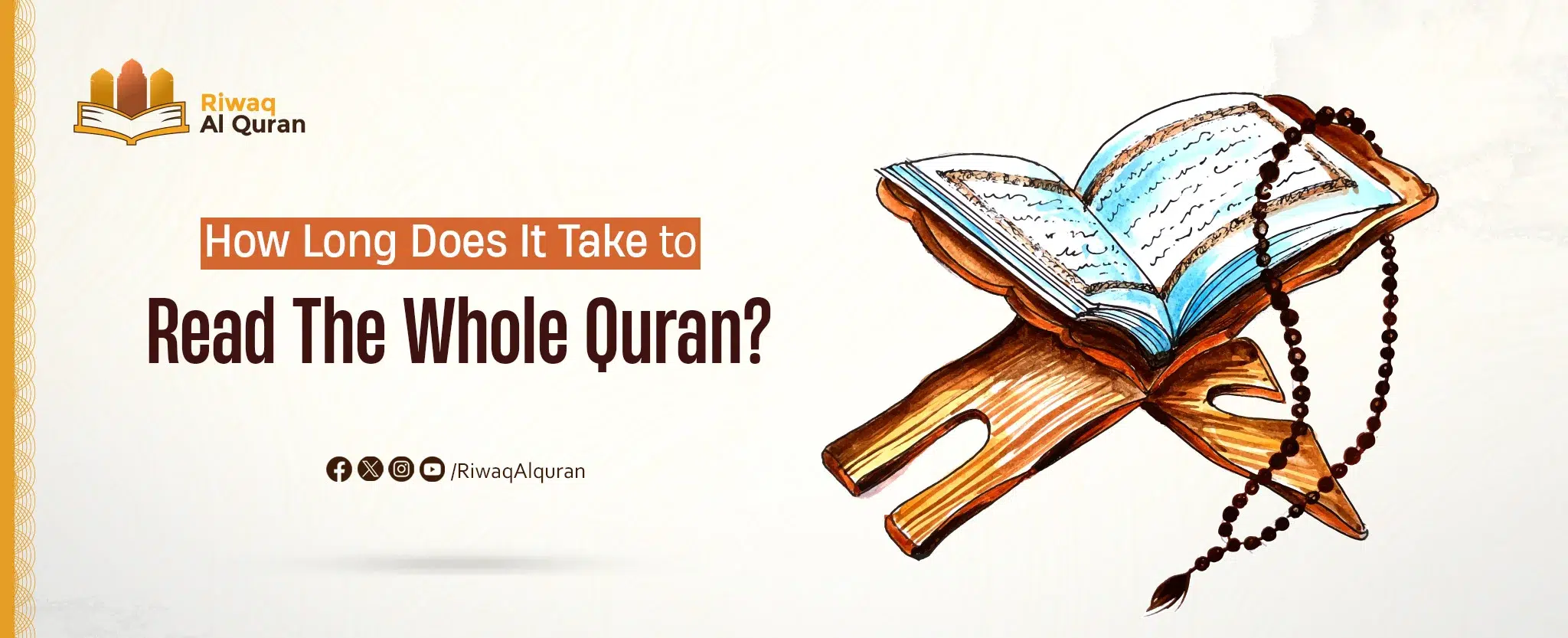Are you curious about how long it takes to read the Quran? Whether you’re setting a personal goal, seeking spiritual fulfillment, or simply exploring, understanding the time it takes can help you plan your reading journey effectively.
Imagine being able to savor each verse, letting its timeless wisdom resonate with your heart, without feeling rushed or overwhelmed. By the end of this article, you’ll have a clear picture of what to expect and how to tailor your reading pace to suit your lifestyle and spiritual needs.
Dive in, and let’s uncover how you can make the most of this enlightening experience.

Credit: resala-academy.com
Factors Influencing Reading Time
Reading speed varies among people. Some read fast, others slow. Speed affects how long it takes to read the Quran. Fast readers may finish sooner. Slow readers take longer. Practice can improve speed. Regular reading helps too.
Understanding Arabic is key for reading the Quran. Those fluent read faster. Beginners need more time. Language skills affect reading time. Learning helps improve speed. Classes can aid understanding. Fluent readers enjoy the text more.
Knowing the script speeds up reading. Familiarity helps with quicker reading. Those new to Arabic take longer. Practice makes it easier. Regular exposure is beneficial. Recognizing letters aids fluency. Over time, reading becomes smoother.

Credit: quranonline.com
Approaches To Reading
Reading the Quran can vary in time depending on several factors. Some might take a month, reading a section daily, while others might finish it in less than a week by dedicating more time each day. Personal reading speed and understanding also influence the duration.
Sequential Reading
Sequential reading means starting from the beginning. You read each page in order. This helps understand the flow of the Quran. Consistency is key here. Reading a bit each day helps finish the Quran. This method takes time but offers a clear understanding.
Thematic Reading
Thematic reading involves focusing on specific themes. You can choose topics like patience or gratitude. This method helps in understanding key messages. It’s great for those who want to explore specific ideas. This way, learning becomes more focused and meaningful.
Segmented Reading
Segmented reading breaks the Quran into parts. You can read by chapters or sections. This approach helps manage reading time better. Flexibility is a benefit here. It’s useful for those with limited time. It offers a structured way to complete the Quran.
Daily Reading Strategies
Reading the Quran every day helps a lot. Pick a time that suits you. Stick to it every day. This makes reading a habit. Habits make things easier over time. Morning is a good time. It is quiet and peaceful.
Break your reading into small parts. Read a little bit each day. This keeps you from feeling tired. Celebrate when you finish a part. This gives you more energy to continue. Small steps lead to big achievements.
Some days are busy. That is okay. Be flexible with your reading time. If mornings are busy, try evenings. The important part is to read every day. Even a few minutes count. Make reading a part of your life.
Tools And Resources
Listening to the Quran can be a helpful tool. Many people find it easier to understand. Audio aids can help with pronunciation and rhythm. They make learning engaging. You can listen during daily activities. Audio is available in different languages too. This makes understanding easier for non-native speakers.
Translation guides are valuable for understanding meanings. They break down complex words. These guides often provide context. This helps in grasping the essence of the text. They are available in many languages. Guides are useful for beginners and advanced learners alike. They can bridge the language gap effectively.
Online platforms offer interactive learning. They provide access to various resources. You can find videos, audios, and texts there. Platforms often have community support. This allows for discussion and sharing. Online tools are accessible anytime. They offer flexible learning at your own pace.
Common Challenges
Language barriers can make reading the Quran hard. Many people do not speak Arabic. They need to learn new words. This takes time and patience. Understanding the meaning is important. Translations help but are not perfect. Some words have deep meanings. This can confuse readers.
Time constraints are another challenge. People have busy lives. Work and school take much time. Finding time to read is hard. Reading the Quran needs focus. It is not easy to read in a hurry. Short sessions can help.
Distractions make it hard to focus. Phones and TV are common distractions. Quiet places are best for reading. Some people find noise distracting. It is best to read in a calm place. A clear mind helps understanding better.

Credit: riwaqalquran.com
Personalizing The Journey
Setting personal goals is a great start. Decide how much you want to read daily. This helps in tracking progress. Small goals are easier to achieve. Celebrate small wins. They motivate you to continue.
Creating a comfortable environment is crucial. Find a quiet place. Use soft lighting. Sit in a comfy chair. This helps focus. Avoid distractions. Turn off your phone. Make sure you have enough light.
Seeking support and guidance can be helpful. Join a study group. Ask for advice. Share experiences with others. Get tips from those who have read it. Learn from their journey. Support makes the process easier.
Cultural And Spiritual Significance
The Quran offers deep wisdom and guidance. It teaches about faith and values. Many find hope and comfort in its words. The Quran’s teachings help people lead better lives. These teachings are central to Islam and Muslim traditions.
Reading the Quran can strengthen your spiritual bonds. It helps you feel closer to God. Many read it to reflect and pray. Its words bring peace to the heart. Regular reading is a spiritual practice for many.
The Quran holds rich cultural meanings. It reflects the history of Islam. Many cultures celebrate its teachings. Its stories are shared in homes and schools. Understanding the Quran can bring insight into Muslim cultures.
Frequently Asked Questions
How Many Hours To Read The Quran?
Reading the Quran cover to cover usually takes about 20 to 30 hours. This depends on your reading speed and familiarity with Arabic. Beginners may take longer, while experienced readers might finish sooner. Consistent daily reading can help you complete it within a month.
Can I Read The Quran In One Day?
Reading the Quran in one day is challenging but possible. It requires around 20 to 24 hours of continuous reading. Most people prefer to read it over several days or weeks. This approach allows for better understanding and reflection on the verses.
What Is A Good Daily Quran Reading Routine?
A good daily Quran reading routine involves reading a few pages or a chapter daily. Aim for 20-30 minutes each day. This helps maintain consistency and allows you to finish the Quran in a month or two. Adjust the routine based on your schedule and goals.
How Long Does It Take Beginners To Read?
Beginners may take longer, around 40 to 50 hours, to read the Quran. Familiarity with Arabic script and language impacts reading speed. Regular practice and guided learning can help improve fluency. Patience and consistency are key to progressing as a beginner.
Conclusion
Reading the Quran is a personal and meaningful journey. Time varies for everyone. Some may finish in weeks, others in months. It depends on reading speed, understanding, and dedication. Regular reading and reflection enrich the experience. Enjoy the process, not just the goal.
Make a reading plan that suits your lifestyle. Consistency is key. A little each day adds up over time. Patience and persistence will guide you through. Embrace the learning and spiritual growth. The Quran offers wisdom and peace to its readers.
Discover its teachings at your own pace.
